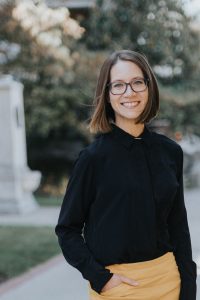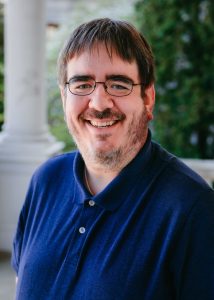Published on
Did you know that Mizzou Academy was the first online school to get an Advanced Placement course approved by the College Board?

More than twenty years ago, Karen Scales, who now serves as Mizzou Academy’s global English Language Arts division chair, approached the College Board about launching Advanced Placement or AP courses at Mizzou Academy. At the time, the College Board was—skeptical.
“A core objective of AP learning involves collaborative scholarship,” explains Scales, “the kind of meaningful thought work that happens when learners come together to ask questions, discuss, explore, and debate. The College Board wondered how that could happen with self-paced students working independently, entirely outside the classroom environment. It was a fair question. After all, it had never been done before. But that’s the heart of our mission at Mizzou Academy: We assess student needs, and then we innovate to meet those needs.”
In 2001, due in large part to Scales’ advocacy, Mizzou Academy launched their first AP course, Advanced Placement English: Literature & Composition. They now have 9 Advanced Placement courses all approved by the College Board including AP English Literature, AP English Language and Composition, AP U.S. History, AP Computer Science, AP Statistics, AP Calculus A.B, AP Comparative Government, AP U.S. Government, and AP Psychology.
“The Mizzou Academy team are innovators,” says executive director, Kathryn Fishman-Weaver. Fishman-Weaver says she loves this story about advocating for Advanced Placement in an online setting as “forging new pathways for acceleration, enrichment, and advancement is part of what we do at Mizzou Academy.”
A Team that Understands Gifted Learners

Like many on the team, Fishman-Weaver has a strong background in gifted education. Before joining the Mizzou Academy’s administrative team in 2015, she ran an equal opportunity gifted education program at a large public high school for several years. Fishman-Weaver’s research on affective development and inclusive practices for neurodiverse students has led to celebrated publications. For example, in 2019, her book, Wholehearted Teaching of Gifted Young Women, was nominated for the NAGC Scholarly Book of the Year award. Her 2020 book, Brain Based Learning with Gifted Students, which explores teaching neuroscience in the 3rd-6th grade classroom, was named by Book Authority as one of the best gifted education books of all time.
“We have so many great stories of faculty and staff advocating for gifted learners. Members of our team often present at the Gifted Association of Missouri’s annual and district conferences, and many teach courses or guest lecture at the Missouri Scholars Academy,” says Fishman-Weaver. She is quick and proud to give examples to support this claim. “Let me share three more quick stories.”
First, she tells about how Nina Sprouse, Division Chair for Social Studies, founded and led the gifted education program at Climax Springs. Next she talks about Marilyn Toalson, a Language Arts specialist, who has over 30 years’ experience teaching and working with gifted learners across all grades. Toalson is also a founder and co-director of College for Kids Inc., a summer program for gifted elementary and middle school learners and has experience working as a gifted education specialist for DESE. “Ms. Toalson was also my gifted education teacher in junior high.” Her third example is Lou Jobst, a Lead Teacher in our Language Arts program who was a founding instructor at the Missouri Scholars Academy where he taught for over 25 summers. In talking with Dr. Fishman-Weaver you get the sense that she could keep giving powerful examples like this all afternoon.
National Association for Gifted Children 2022 Conference
Essentially, sharing powerful stories is just what she and Brian Stuhlman did at the National Association for Gifted Children conference last week. Stuhlman and Fishman-Weaver ran a well-attended black and gold booth in the vendor hall and presented an enthusiastic session on acceleration and enrichment.

Like his colleagues mentioned in this story, Brian Stuhlman, who serves as the middle school coordinator at Mizzou Academy, is passionate about gifted education and has worked in this space for decades. Stuhlman is the program director for the Missouri Scholars Academy (a state-wide summer program for gifted youth), and co-director of our local district chapter for the Gifted Association of Missouri (GAM).
“I choose to work in gifted education for a number of reasons,” says Stuhlman. “First, gifted students are often surprisingly underserved in schools, victims of a perception that they will survive and thrive without much guidance or intervention. I want to advocate for gifted students and give them opportunities to reach further for their full potential. I also love all the varieties of gifted learners; they are both interested and interesting. On a daily basis, I’m inspired by their curiosity, compassion, creativity, and courage.”
Stuhlman recently published an essay in Connected Classrooms: People-Centered Approaches for Online, Blended, and In-Person Learning. In this essay, Stuhlman compares his work teaching gifted students to conducting an orchestra. He says he is thankful for “the melodies he’s gotten to play and the talented musicians who play them.”
To learn more about opportunities for gifted learners at Mizzou Academy you can visit their website or contact their offices.